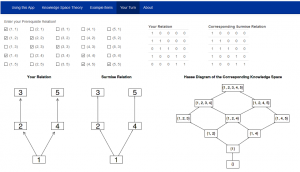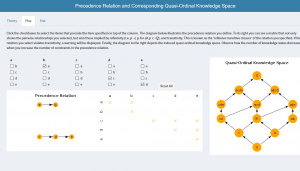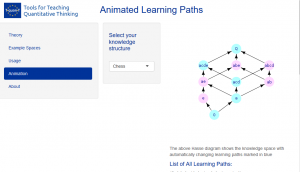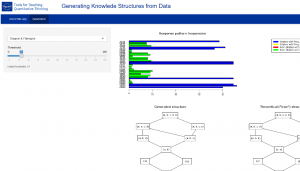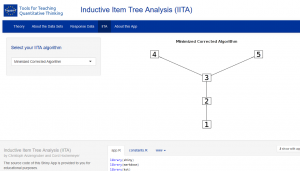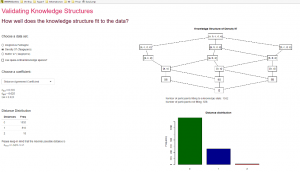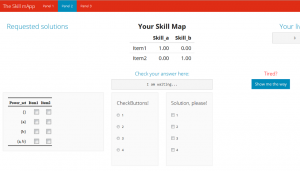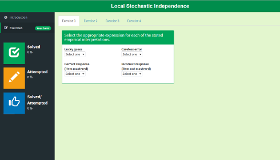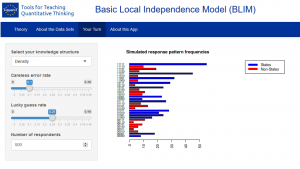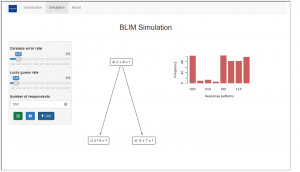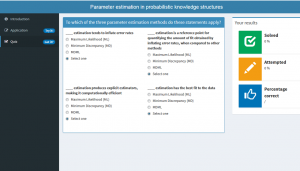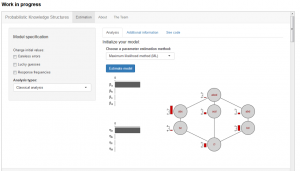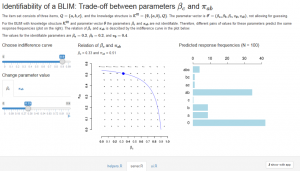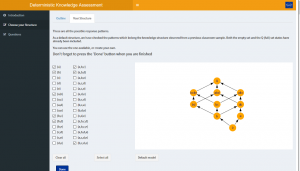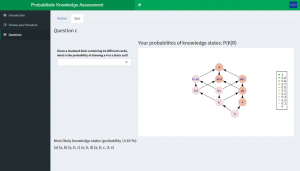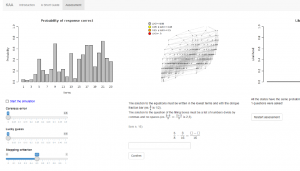Surmise Relation
This app demonstrates surmise relations and the corresponding knowledge spaces.
Precedence Relation and Corresponding Quasi-Ordinal Knowledge Space
This app illustrates the one-to-one correspondence between a precedence relation among a number of problems and a quasi-ordinal knowledge space.
Properties of Knowledge Spaces
This app lets you enter a knowledge structure and shows various properties of the corresponding knowledge space.
Animated Learning Paths
This app illustrates learning paths in a knowledge structure.
Fringe & Neighbourhood
This app illustrates the fringe and neighbourhood of knowledge states.
Generating Knowledge Structures from Data
This app illustrates a simple approach to generating knowledge structures from response patterns.
Inductive item Tree Analysis (IITA)
This app illustrates the use of IITA to generate surmise relations from data.
Validation of Knowledge Structures
This app applies several validation coefficients to a selection of knowledge structures and respective data. It is based on a student app developed at the 2018 TquanT seminar in Glasgow.
Skill mApp
The Skill mApp aims to provide a first contact with both the Knowledge Space Theory and the skill map theory.
Local Independence
This app exemplifies the local independence assumption of the basic local independence model.
Simulating BLIM
This app illustrates the application of the BLIM model to simulating response patterns from a knowledge structure.
BLIM Simulation
This app lets you simulate response patterns based on a given knowledge space using the BLIM.
Parameter Estimation
This app uses three procedures to estimate the parameters for a data set and a knowledge structure specified by the user.
Classical and Bayesian Parameter Estimation
This app demonstrates classical and Bayesian parameter estimation methods for probabilistic knowledge structures.
Identifiability
This app visualizes the trade-off between the parameters of a non-identifiable basic local independence model (BLIM).
Deterministic Knowledge Assessment
This app lets you build your own knowledge structure on a set of five items on elementary probability theory, and lets you perform a deterministic knowledge assessment on that structure. It is derived from the app on probabilistic knowledge assessment.
Probabilistic Knowledge Assessment
This app lets you build your own knowledge structure on a set of five items on elementary probability theory, and lets you perform a probabilistic knowledge assessment on that structure. Especially the UI is based on a students’ app.
Knowledge Assessment App
The Knowledge Assessment App aims to give a demonstration of how the adaptive assessment of knowledge developed within the Knowledge Space Theory (KST) framework works in practice. There exists an extensive documentation for this app.

